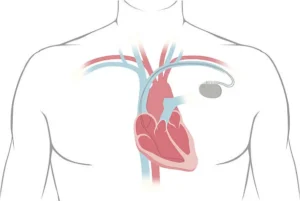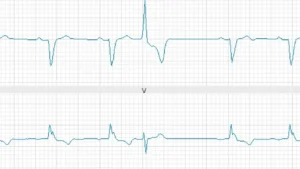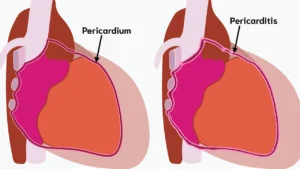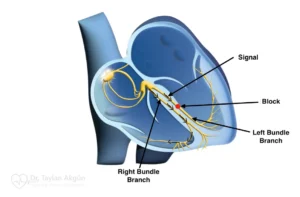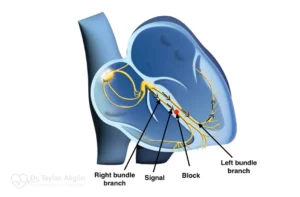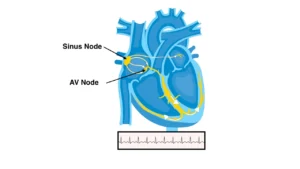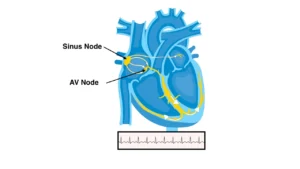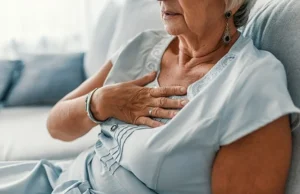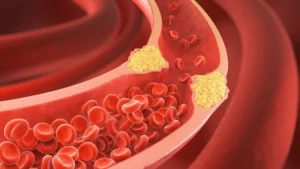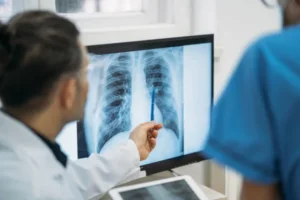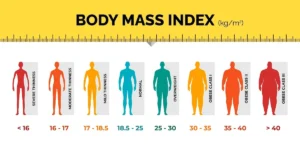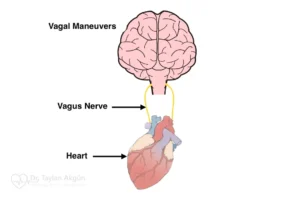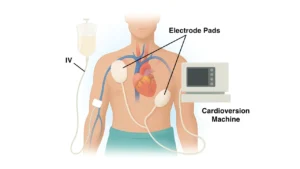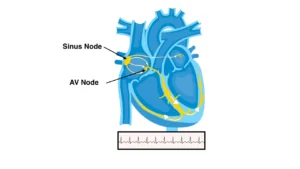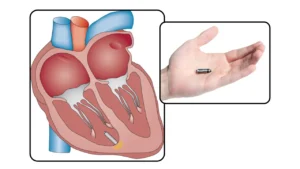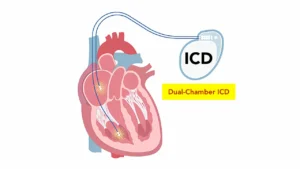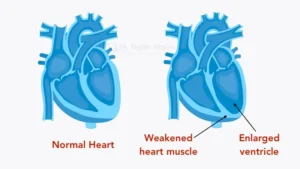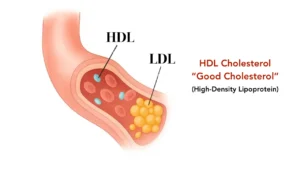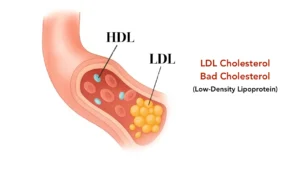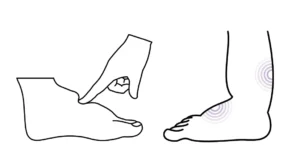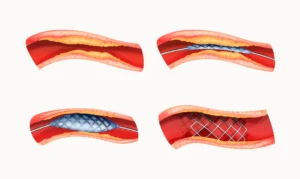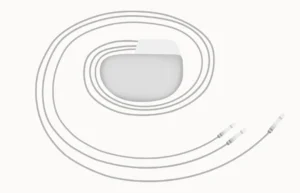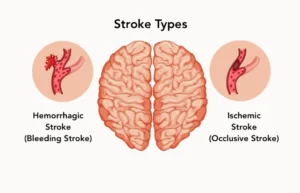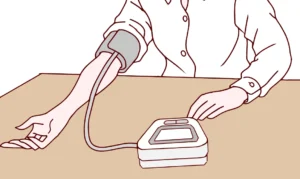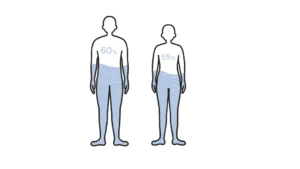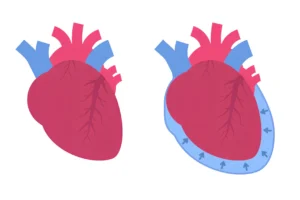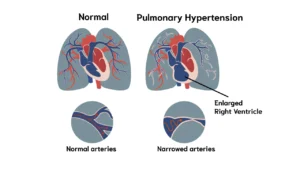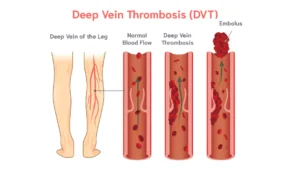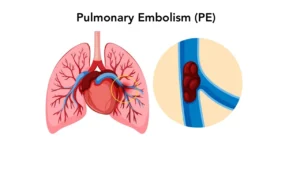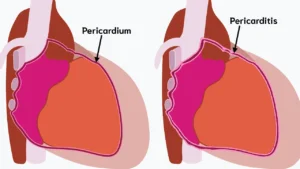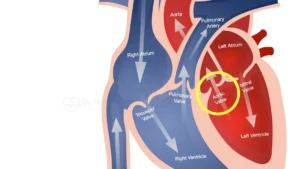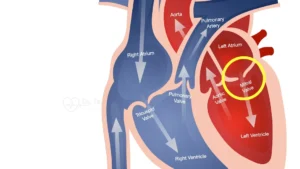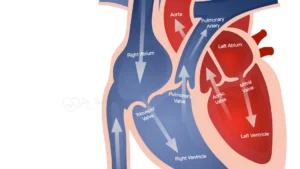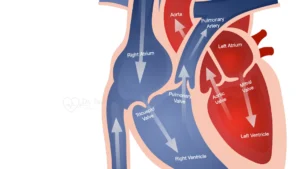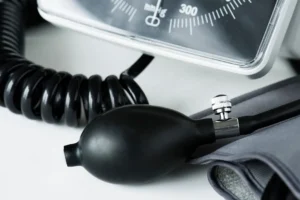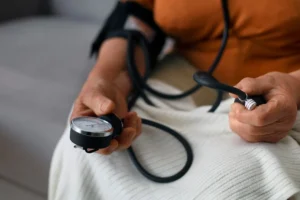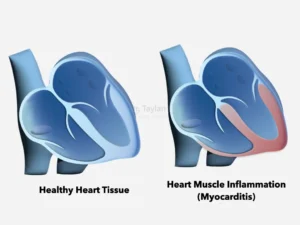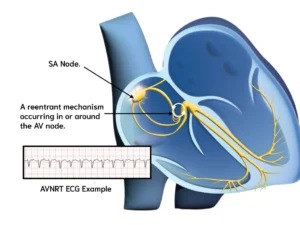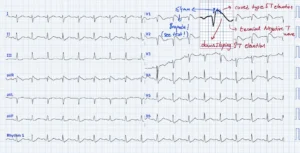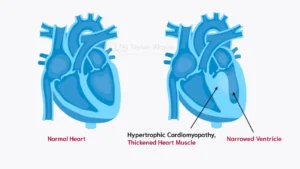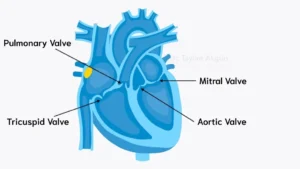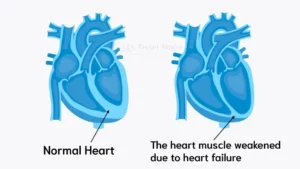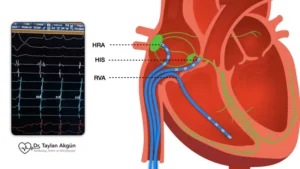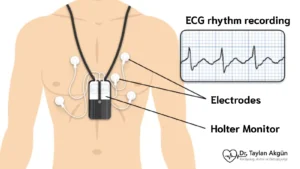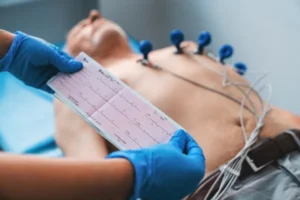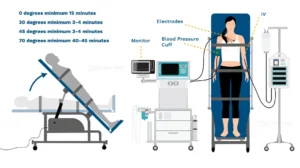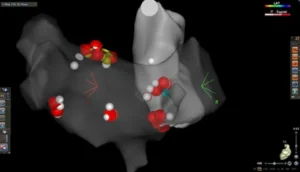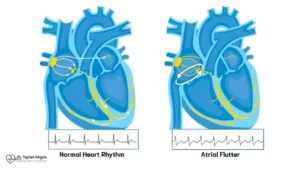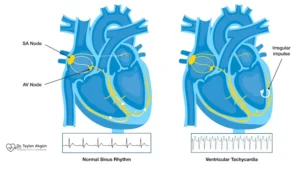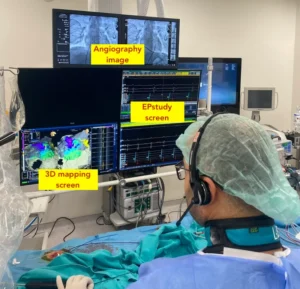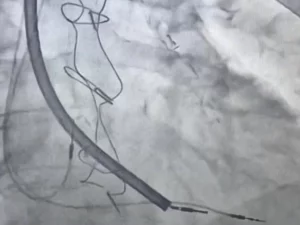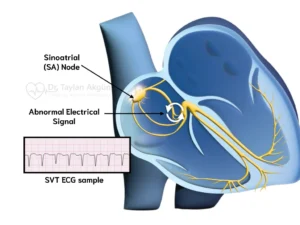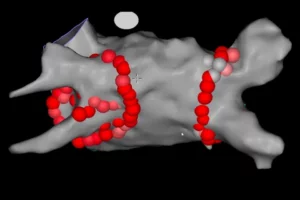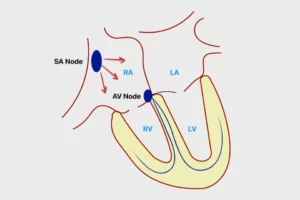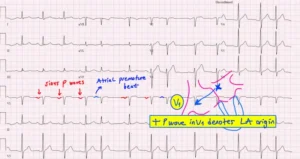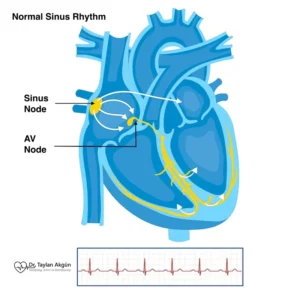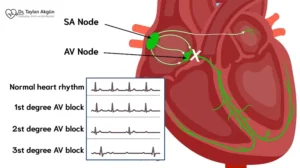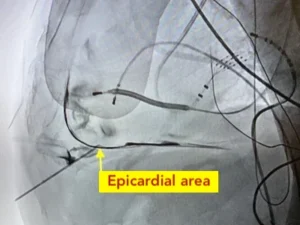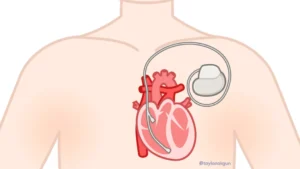Dr. Taylan Akgün Diseases and Treatments
Ablation, pacemaker and cardiac arrhythmia treatments are modern cardiological methods used to correct various problems affecting the electrical system of the heart. The aim is to regulate heart rhythm, reduce symptoms and improve quality of life.
Orthostatic hypotension: Symptoms, Causes and Treatment
Orthostatic hypotension is a sudden drop in blood pressure when…
Vasovagal Syncope: Symptoms, Causes and Treatment
What is vasovagal syncope? Vasovagal syncope is the most common…
Cardiac Syncope: Causes, Symptoms and Treatment
What is cardiac syncope? Cardiac syncope is a sudden loss…
Living With a Pacemaker: Key Precautions
You can usually return to normal life after a pacemaker…
Premature Ventricular Contraction (PVC) Ablation
Premature Ventricular Contraction (PVC) Ablation PVC ablation is a minimally…
Troponin: what it is, and what high levels mean
What is troponin? Troponin is a group of proteins that…
Arm Numbness: What Are the Causes?
Arm numbness is often temporary and harmless. However, in some…
Dressler Syndrome: Symptoms, Causes, and Treatment
What is Dressler syndrome? Dressler syndrome is a type of…
Pulse: Normal Values, Causes of High or Low Heart Rate
What is pulse? Pulse refers to how many times the…
Left Bundle Branch Block (LBBB)
What is left bundle branch block? Left bundle branch block…
Right Bundle Branch Block (RBBB)
Right bundle branch block: what is it? Right bundle branch…
Dizziness: Causes, Symptoms, and When to Seek Help
Dizziness is a common complaint characterized by a sensation of…
Shortness of Breath (Dyspnea): Causes, Symptoms
Shortness of breath is the sensation of not getting enough…
When Are Arrhythmias Dangerous?
For many people diagnosed with an arrhythmia, the most difficult…
Living with arrhythmias: what to pay attention to
When people hear the term arrhythmia, many immediately fear that…
Blood Thinners: Uses, Types, Side Effects, and Safety
Blood thinners are medications that prevent clot formation in blood…
Vitamin K: Benefits, Deficiency, and Food Sources
Vitamin K is an essential vitamin required for blood clotting,…
Heart Palpitations When Lying Down: Causes, Symptoms
Heart palpitations when lying down Heart palpitations that begin when…
Heart Palpitations in Young Adults: Causes, and Triggers
Heart palpitations in young adults Many young people experience significant…
Heart Palpitations in Older Adults: Causes, Risks, and Evaluation
Why palpitations matter with aging Palpitations in older adults have…
Triglycerides: What They Are, Causes, and Health Risks
Triglycerides are an important type of fat found in the…
Chest X-ray: What It Is, Why It’s Done and What It Shows
What is a chest X-ray? A chest X-ray is a…
Obesity: Causes, Health Risks and Treatment Options
What is obesity? Obesity is a condition in which an…
Causes of Left Arm Pain
Left arm pain is a common complaint in daily life…
Pulsed Field Ablation (PFA)
Pulsed Field Ablation (PFA) is a new-generation catheter ablation technology…
Vagal Maneuvers
Vagal maneuvers are simple, non-invasive techniques used to slow the…
Cardioversion
What is cardioversion? In atrial fibrillation, atrial flutter, and some…
Sinus Tachycardia: Symptoms, Causes, and Treatment
Sinus tachycardia is a condition in which the heart beats…
Leadless Pacemaker
A leadless pacemaker is a small cardiac pacing device that…
Implantable Cardioverter Defibrillators (ICDs)
An implantable cardioverter defibrillator (ICD) is a small electronic device…
Exercise Stress Test
An Exercise Stress Test is a commonly used heart test…
Potassium
What Is Potassium and Why Is It Important? Potassium is…
B Vitamins
B vitamins are a complex of 8 different vitamins that…
Dilated Cardiomyopathy
Dilated cardiomyopathy (DCM) is a condition in which the heart…
HDL Cholesterol
HDL cholesterol, short for high-density lipoprotein cholesterol, is often called…
LDL Cholesterol
LDL cholesterol, short for low-density lipoprotein cholesterol, is often referred…
Hypertrophic Cardiomyopathy
Hypertrophic cardiomyopathy (HCM) is a condition in which the heart…
Edema
Edema refers to abnormal accumulation of fluid in the body’s…
Balloon Angioplasty and Stent
Balloon angioplasty and stent placement are minimally invasive procedures used…
Cardiac Resynchronization Therapy (CRT)
Cardiac Resynchronization Therapy (CRT) is an advanced pacing treatment used…
Stroke: Symptoms, Causes, and Treatment
A stroke occurs when blood flow to part of the…
Atherosclerosis: Symptoms, Causes, and Treatment
Atherosclerosis is a condition in which fatty deposits, cholesterol, and…
Hypotension (Low Blood Pressure)
Hypotension refers to abnormally low blood pressure, meaning that the…
High-Fiber Foods
High-fiber foods are plant-based carbohydrates that your body cannot digest.…
DASH Diet
The DASH diet is a scientifically-based nutrition plan specifically designed…
Hyponatremia (Sodium Deficiency)
Hyponatremia is a condition in which the sodium level in…
Aortic Aneurysm: Symptoms, Causes, and Treatment
An aortic aneurysm is an abnormal enlargement (dilation) of the…
Echocardiogram
An echocardiogram is a non-invasive ultrasound test that uses sound…
Omega-3
Omega-3 is a type of polyunsaturated fatty acid that cannot…
Pericardial Effusion: Symptoms, Causes, and Treatment
Pericardial effusion is a condition in which excess fluid accumulates…
Pulmonary Hypertension: Symptoms, and Treatment
Pulmonary hypertension is a condition in which the blood pressure…
Deep Vein Thrombosis (DVT): Symptoms, and Treatment
Deep vein thrombosis (DVT) is a condition in which a…
Pulmonary Embolism: Symptoms, Causes, and Treatment
Pulmonary embolism is a potentially life-threatening condition that occurs when…
Endocarditis: Symptoms, Causes, and Treatment
Endocarditis is a serious condition in which the inner lining…
Pericarditis: Symptoms, Causes, and Treatment
Pericarditis is a condition in which the pericardium—the thin, protective…
Aortic Valve Disease: Symptoms, Causes, and Treatment
Aortic valve disease refers to conditions in which the aortic…
Mitral Valve Disease: Symptoms, Causes, and Treatment
Mitral valve disease refers to conditions in which the mitral…
Coronary Angiography
Coronary angiography is a diagnostic procedure used to visualize the…
MitraClip
MitraClip is a minimally invasive catheter-based procedure used to treat…
Transcatheter Aortic Valve Replacement (TAVR)
Transcatheter Aortic Valve Replacement (TAVR) is a minimally invasive procedure…
Cholesterol
Cholesterol is a fat-like substance (lipid) found in the blood…
Magnesium
Magnesium is one of the essential minerals necessary for our…
Secondary Hypertension: Symptoms and Causes
Secondary hypertension is a form of high blood pressure that…
Essential Hypertension:: Symptoms and Causes
Essential hypertension—also known as primary hypertension—is a condition in which…
Which Sports Should Heart Patients Do?
Which Sports Should Heart Patients Do? Sports recommended for heart…
How Should Hypertension Patients Eat?
Hypertension is a chronic disease characterized by consistently high blood…
What Foods Are Good for Heart Health?
Regular and balanced nutrition is as important as medication in…
Sudden Cardiac Arrest
Sudden cardiac arrest (SCA) is a medical emergency in which…
Ventricular Fibrillation (VFib): Symptoms and Treatment
Ventricular fibrillation, commonly called VFib, is a life-threatening heart rhythm…
How to Lower Blood Pressure?
What is High Blood Pressure? High blood pressure, or hypertension,…
Heart Attack: Symptoms, Causes, and Treatment
A heart attack, medically known as myocardial infarction, occurs when…
Chest Pain
Chest pain is one of the most frightening symptoms you…
Myocarditis (Heart muscle inflammation)
Myocarditis is a condition in which the heart muscle becomes…
AV Nodal Reentrant Tachycardia (AVNRT)
AV nodal reentrant tachycardia (AVNRT) is one of the most…
Brugada Syndrome: Symptoms, Causes, and Treatment
Brugada syndrome is an inherited arrhythmia that affects the heart’s…
Body Mass Index (BMI)
What is Body Mass Index? Body Mass Index (BMI) is…
Cardiomyopathy: Symptoms, Causes, and Treatment
Cardiomyopathy is a group of conditions that affect the heart…
Cryoablation
Cryoablation is a catheter-based ablation technique used to treat certain…
Radiofrequency Ablation in Heart
Radiofrequency ablation (RF ablation) is the most widely used catheter…
Heart Valve Diseases: Symptoms and Causes
Heart valve disease refers to conditions in which one or…
High Blood Pressure: Symptoms and Causes
High blood pressure (HBP), also known as hypertension, is a…
Coronary Artery Disease (CAD): Symptoms and Causes
Coronary artery disease (CAD) is a condition in which the…
Heart Failure: Symptoms, Causes, and Treatment
Heart failure is a condition in which the heart muscle…
Electrophysiology (EP) Study
An Electrophysiology (EP) Study is a specialized cardiac procedure used…
Effects of Diet, Exercise and Lifestyle on AFib
Lifestyle, balanced diet, and regular exercise play important roles in…
Holter Monitor
A Holter monitor is a portable ECG device that continuously…
Electrocardiogram (ECG)
An electrocardiogram (ECG) is one of the most important and…
Electrical Heart Disease
What is Electrical Heart Disease? Electrical heart disease refers to…
Tilt Table Test
The Tilt Table Test is a diagnostic test used to…
Cardioneuroablation
Cardioneuroablation (CNA) is a specialized catheter-based procedure used to treat…
Atrial Flutter: Symptoms, Causes, and Treatment
Atrial flutter is a type of arrhythmia in which the…
Ventricular Tachycardia (VT): Symptoms and Causes
Ventricular tachycardia, often abbreviated as VT, is a fast heart…
Cardiac Ablation
Cardiac ablation is a medical procedure used to treat heart…
Heart Palpitations: Causes, Symptoms and Treatment
Heart palpitations are the sensation of being aware of your…
Pacemaker Lead Extraction
What is Lead Extraction? Pacemaker removal may be necessary due…
Bradycardia (Low Heart Rate): Symptoms and Treatment
Bradycardia is a condition in which the heart beats more…
Supraventricular Tachycardia (SVT)
Supraventricular tachycardia is a arrhythmia characterized by sudden episodes of…
3D Ablation and Mapping
When doctors perform cardiac ablation to fix abnormal heart rhythms,…
Syncope (Fainting): Symptoms, Causes and Treatment
Syncope, commonly known as fainting, is a sudden and temporary…
Atrial Fibrillation Ablation
Atrial fibrillation (AFib) ablation is a catheter-based procedure used to…
How Does Your Heart Work?
Your heart is a muscular pump about the size of…
Premature Beats: Symptoms, Causes and Treatment
Premature beats are early heartbeats that occur sooner than expected…
Atrial Fibrillation: Symptoms, Causes and Treatment
Atrial fibrillation (AFib or AF) is a common heart rhythm…
Arrhythmias: Symptoms, Causes and Treatment
Arrhythmias are conditions in which the heart beats too fast,…
Tachycardia (Fast Heart Rate): Symptoms and Treatment
Tachycardia means that your heart is beating faster than normal…
Heart Block (AV Block): Symptoms and Treatment
Heart block, also called atrioventricular (AV) block, is a condition…
Wolff-Parkinson-White (WPW) Syndrome
Wolff-Parkinson-White (WPW) syndrome is a heart rhythm condition that you…
Epicardial Ablation
Epicardial ablation is a specialized treatment for arrhythmias that start…
Cardiac Pacemaker
What is a cardiac pacemaker? A cardiac pacemaker is a…



